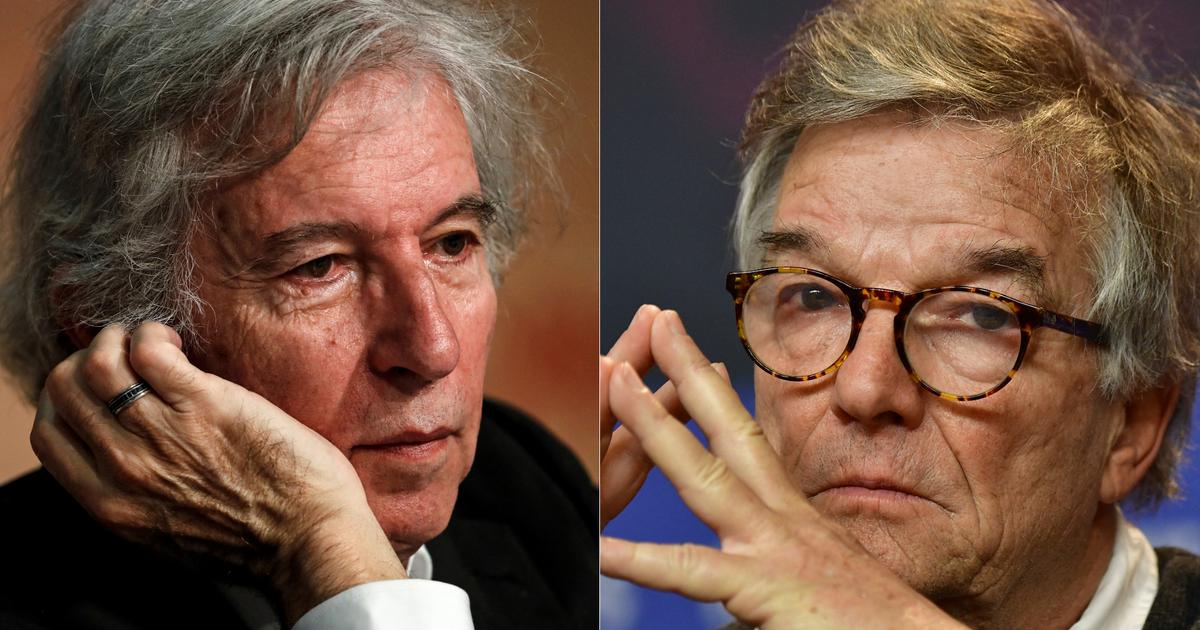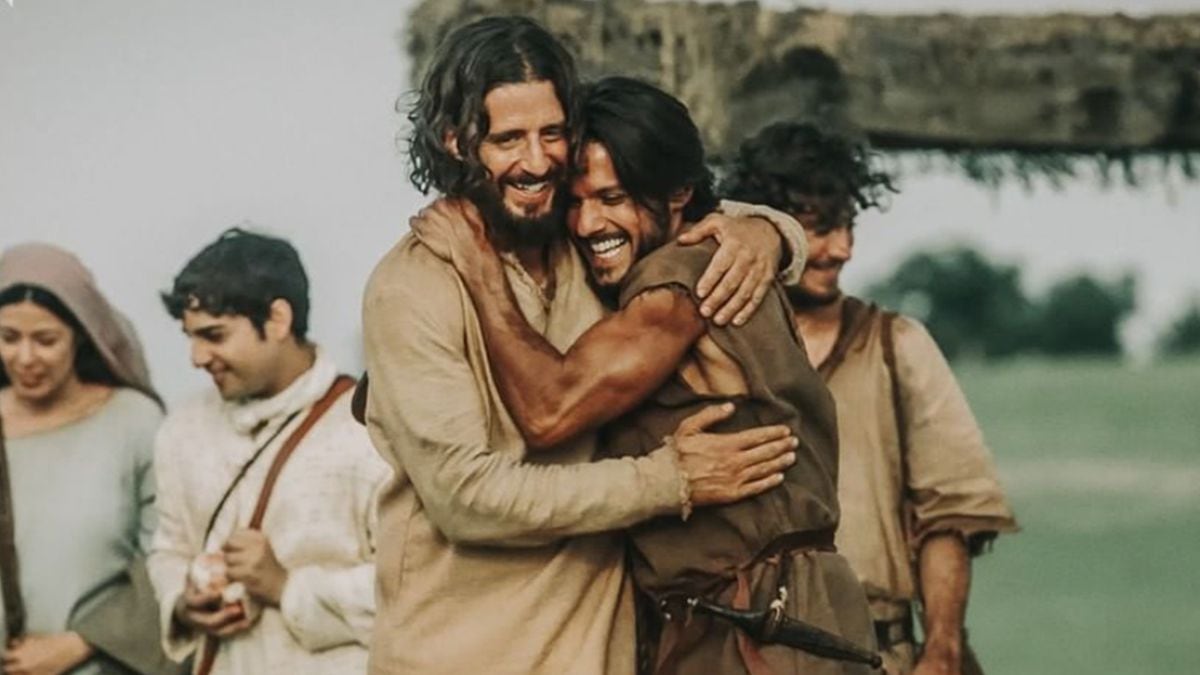Icon: enlarge
The Prime Minister dancing to the Pointer Sisters: Hugh Grant in "Actually ... Love"
Photo: ddp images
Christmas time is TV time!
We say why you can still fall in love with "Actually ... Love" and why "Kevin - Alone at Home" has finally mutated into a horror film on his 30th birthday.
Next week there will be a second part with current productions.
Icon: enlarge Photo: ddp images
"Indeed ... love," Amazon Prime Video
When you think of this movie, the first thing that probably springs to mind is the newly elected Prime Minister (Hugh Grant) dancing to the Pointer Sisters on Downing Street.
Or Mark (Andrew Lincoln), who silently pokes at his best friend's wife (Keira Knightley).
Or Karen (Emma Thompson), who finds out on Christmas Eve that her husband (Alan Rickman) gave his assistant a nicer gift than her.
If you know the film about the hundred facets of love, other stories from Richard Curtis' "Really ... Love" will come to mind.
Often they are so stereotyped that you simply cannot forget them, even if you want to.
But they are also very beautiful, especially in times of social distancing.
Like the first scene in the film, which is often forgotten because of the abundance of characters: Hundreds of people are waiting for their loved ones in the arrivals hall at Heathrow Airport.
And when they come, they hug, kiss and cuddle.
That came up short this year.
But that will change again.
Elisa von Hof
Icon: enlarge
Black pedagogy for the naughty child: Macaulay Culkin in "Kevin - Alone at Home"
Photo: ddp images
"Kevin - Home Alone," Disney +
There are films that everyone seems to know, but not yourself.
I can't remember what kept me from going to the cinema in 1990 - probably when I was in my early twenties I just didn't feel like a screeching eight year old.
Now, on his 30th birthday, I've finally seen him.
What can I say?
Either the film has aged badly or I, at least I found it horrible.
The sadistic black pedagogy alone is used to persuade poor Kevin that something is wrong with him and that he is to blame for the chaos that reigns in his family.
And then everything in this film is simply too big, not just the shoulder-padded tops of the adults, also the glasses, cars and above all this absurdly oversized house that looks like a bad copy of a count's estate.
Donald Trump had a guest appearance in the sequel "Kevin - Alone in New York" (which he forced the producers to do because they were only allowed to shoot in his Trump Tower), and the first part also seems to me like a message from the clean , imaginary America that fans still dream of.
When Kevin tried to defend himself against two intruders, I kept thinking of this crazy couple who stood armed on their doorstep during the US election campaign because peaceful demonstrators were passing by their house.
For me, horror clearly outweighs humor.
Oliver Kaever
Icon: enlarge
Nuclear family propaganda as a series of series: Peter Weck and Thekla Carola Wied in »I marry a family«
Photo:
Dieter Klar / picture alliance / dpa
»I'm marrying a family«, ZDF Mediathek
There is a golden question that you can use to get any halting conversation with people who were in their prime television childhood in the eighties going again: How long did you think that giant schnauzer Lulu really ate Tom's missing guinea pig Bommel, even though she did only licked her lips because she had forbidden to swallow the goulash of the gruff housekeeper Frau Rabe?
If you want to go deeper afterwards, you can then talk about how sobering it was when you finally realized what perfidious nuclear family propaganda "I'm going to marry a family" was actually going on.
In spite of the supposedly progressive patchwork constellation, all of the figures that orbit the Schumann family, who are soldered together like satellites, were drawn as sad, incomplete people without children, namely the couple Bille and Alfons, who were in constant trouble.
The two-part Christmas episode "Schumanns Winterreise" is nevertheless the best of retro escapism with its snowy hut holiday comfort.
Anja Rützel
Icon: enlarge
Ability to self-irony: Bruce Willis in »Die Hard 4«
Photo: ddp images
"Die Hard 1-5," Amazon Prime Video
Speaking of greetings from the past: Is it just me, or do you look at the macho heroes of the eighties differently after four years at Trump?
Sure, the further they disappear in the rear-view mirror, the more ridiculous their playing with inflated muscles seems anyway, you can also call it social progress.
But Trump stood for the relapse into a past in which supposedly strong guys had the say.
And he partly staged himself as if he were Dolph Lundgren or Chuck Norris.
Like his return to the White House after his corona illness, which looked like a cheap, pompous B-movie.
Bruce Willis' character John McClane in the "Die Hard" series of films seems less tumb.
In contrast to the would-be action hero in the White House, he always had at least a rudimentary ability to self-irony and willingly took counter-blows with a bleeding lower lip.
Oliver Kaever
Icon: enlarge
The »Justus« and his boys: Paul Dahlke in »The Flying Classroom«
Photo: ddp images
»The flying classroom«, Arte media library
Forget the pathetic remakes from 1973 and 2003 - only the first version from 1954 with Paul Dahlke, Paul Klinger and a very young Peter Kraus does justice to Erich Kästner's children's novel.
In it he finally appears himself and accompanies the viewer through the plot as a narrator.
Sure, the chivalrous behavior of the boarding school boys sometimes seems a bit strange, but how this film empathizes with troubled children's souls and never claims that the adults know exactly where to go - that couldn't be more modern.
As befits a really good Christmas film, there is a quiet melancholy over everything.
And also the solemn hope that friendship, human cooperation and generosity will ensure a good future.
Oliver Kaever
Icon: enlarge
The Holländer-Michel offers the charcoal burner boy a heart of stone: Moritz Bleibtreu and Frederick Lau in "The Cold Heart"
Photo: Weltkino / picture alliance / dpa
»The cold heart«, ARD media library
Fairy tale films run en masse over the holidays, and yes, of course also »Drei Nüsse für Cschenbrödel« (in an exhaustive range of 19 broadcast dates on linear television and in the ARD media library, on Netflix, Amazon, MagentaTV and TVNow).
"The cold heart" is different: a gloomy, eerily beautiful parable of human greed, in the imagery with echoes of the great international fantasy films since the "Lord of the Rings" trilogy, but completely independent and free of Black Forest kitsch.
The story of Wilhelm Hauff revolves around a charcoal burner boy who has a stone heart planted in order to become rich and successful.
The director Johannes Naber, who previously shot a bitter grotesque about three management consultants with his film “The Cannibals' Time”, shows here again an inhuman economic system that can only be changed from within.
The little glass man, a forest spirit congenially played by Milan Peschel, says at the end directly into the camera: “You wanted to be the masters of the world.
Make something of it. ”Big goose bumps moment.
Oliver Kaever
Icon: enlarge
»Changement!« - commands and toe stretching: Silvia Seidel as »Anna«
Photo: Erwin Elsner / picture alliance / dpa
»Anna«, ZDF media library
In 1987, important changes in life were set for many children and young people without being noticed.
While they lounged on the sofa full of cookies and followed the painful path that would lead the accident victim Anna (Silvia Seidel) back to the ballet stage in the Christmas series of the same name, they made a formative decision: Did they believe that hard work and perseverance were necessary injustice were, if you wanted to make your dreams come true in life - or would they rather stuff a few more chocolate crossies and decide that the strict ballet master Madame Kralowa with her constant toe stretching and the annoying "changement!" commands would give them a nice ride could?
With a rewatch you can wonderfully compare the attitude at the time with the disenchantment with reality that has now set in.
Anja Rützel
Icon: enlarge
Will the new job in the department store really bring luck?
Dita Parlo in "Ladies' Paradise"
Photo:
Arte
»The paradise of women«, Arte media library
At the end of the day a delicacy not just for lovers.
It is clear that the inhibition threshold is initially great to watch a silent film from 1930, but this reflects fascinating and disturbing very current developments.
The film adaptation of a novel by Émile Zola revolves around the emerging department store giants who wiped out the livelihoods of countless retailers in Paris at the turn of the last century.
And of course, you think about how many of these giants are tottering today and in turn are being devoured by even bigger online giants.
Theoretically, we know that economic cycles are repeated; there is practical illustrative material here.
And what for which: Director Julien Duvivier uses sensational tracking shots and assembly sequences to let the viewer feel the rise of the new and the fall of the old almost physically.
Oliver Kaever
Icon: The mirror


/cloudfront-eu-central-1.images.arcpublishing.com/prisa/ROJKGLFWEZGJ3FOCN3RK6FZ5MU.jpg)





